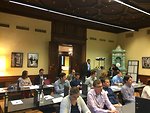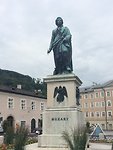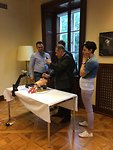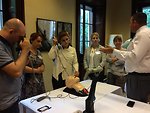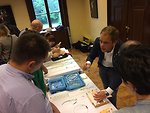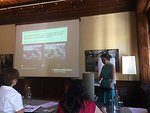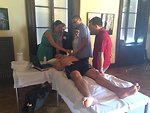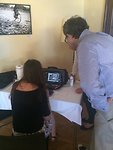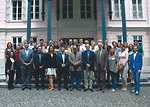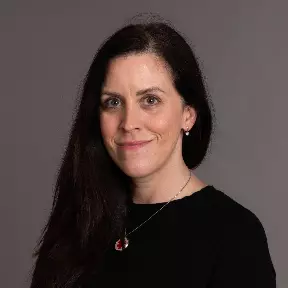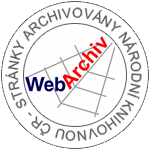Salzburg Medical Seminars were established in 1993. It is a postgraduate medical education program founded by The American Austrian Foundation (AAF), it links physicians from Weill Medical College of Cornell University and other American medical schools with physicians practicing in Central and Eastern Europe, Central Asia, the former Soviet Union and other countries. The AAF organizes a wide range of programs in medicine. Participation is through an open competition and by invitation only.
The seminars take place in a beautiful Schloss Arenberg near the old town of Salzburg, where faculty and fellows are also accommodated. Lectures are held in the Grand Hall with the antique wooden ceiling with gold leaf embellishments, Renaissance doorways and 18th century tiled stove.
The week 19th to 25th June was reserved for Anesthesiology.
Hugh C. Hemmings as Course Director, Joseph F. Artusio Professor and Chair of Anesthesiology and Professor of Pharmacology at Weill Cornell Medical College and Anesthesiologist-in-Chief at New York Presbyterian Hospital/Weill Cornell Medical Center are leading this seminar. His lectures Emerging Mechanisms of General Anesthesia and Development Anesthetic Neurotoxicity were always consistent and full of news in pharmacology and effect of anesthetics.
Marc Moritz Berger is Associate professor in Department of Anesthesiology, Critical Care and Pain Medicine in Salzburg General Hospital/Paracelsus Medical University and his major interest is oxygen – his seminar Hyperoxia in Anesthesia and Critical Care, how hyperoxia doesn’t improve wound healing, but impairs microcircular perfusion, how it has weak beneficial effect on nausea and how it can increase mortality after ROSC with high level of O2, brought a rich discussion.
Ravi Mahajan, Professor of Anesthesia and Intensive Care, Head of Division of the Faculty of Medicine and Health Sciences at University of Nottingham School of Medicine, taught us about patient safety, quality of healthcare, how to measure and improve it. He is also Editor-in-Chief of British Journal of Anaesthesia and he led the workshop Publishing in a Peer-Reviewed Journal.
Stefanie Cheng from New York Presbyterian Hospital/Weill Cornell Medical College specializes in Regional Anesthesia and Acute Pain. She went through peripheral blocks with us and through special conditions when is necessary to consider it due to benefit for patient. She led a workshop Ultrasound Guided Blocks, where we could view several nerve structures. USG technique is going to be quite common in practice, because many colleagues were familiar with it.
Peter Fleischut is the Chief Innovation Officer for New York Presbyterian Hospital and Associate Professor of Anesthesiology in the Department of Anesthesiology at Weill Cornell Medical College. His topics were about quality, safety and technologies (telehealth). He also led a workshop Airway Management Techniques.
Peter Gerner, Professor and Chairman of the Department of Anesthesiology, Critical Care and Pain Medicine of the Salzburg General Hospital/ Paracelsus Medical University, went with us through Anesthesia for thoracic surgeries.
Kane Pryor, Associate Professor of Clinical Anesthesiology at Weill Cornell Medical College, specializes in anesthesia for neurosurgical procedures. He showed us some specific anesthesiological techniques during these procedures with background in neurophysiology and also displayed cognitive issues in anesthesia – especially awareness.
An important part of seminar was Fellows’ Case Presentation. We were supposed present a case during 5 minutes with discussion in other 3 minutes. It is a short time to catch an audience but many topics were so interesting than you just wanted to know the end. We heard about awaken vascular surgeries in ECC in Albania, Difficult Airway Management after wolf bite in Armenia, mysterious hypercoagulation during CPR after trauma in the Netherlands, rupture of abdominal aortal aneurysm in parturient in Hungary, severe generalized tetanus in Ethiopia or TRALI in Lithuania. Instead of these presentations we had many possibilities to discuss and compare our daily work between ourselves during social activities in Schloss Arenberg or on our own trips to town center or to surroundings. During our stay an idea of our further contact rose up and hopefully we will stay in touch for starting an international cooperation and research.
At the end I am very glad that I had that great opportunity to participate on this seminar and hope this is not the end. I can apply for another seminar or for observeship in Austria. And of course now it is up on me to spread knowledge to others in my country.
Many thanks to the American Austrian Foundation and Open Medical Club and Olga Havlova Foundation in Czech Republic.

